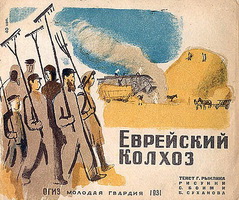
Children's book cover -'Jewish kolkhoz', 1931, Moscow
|
In my childhood village Kholmi (Hills-in English) our family has had many
relatives.
One of them was my second cousin Binyamin Katz, `Binya` for short.
In 1926 he started as fireman chief at the local cement plant which was located
about ten miles away from my village.
On the weekends, Binya, as a custom, handsomely rode back home on the best horse
from his fireman-brigade, enjoying utter admiration of the villagers.
Half-naked children including myself ran enthusiastically after him when he was
entering our village.
One weekend, a chief of the local police (`militia` in Russian) station came to
my village with the intention to organize the “Association for Joint Cultivation of
Land” or `AJCL` for short.
|
[The goal of this policy was to consolidate individual land and labor into
collective farms - mainly kolkhozes.
The Soviet leadership was confident that the replacement of individual peasant farms by
collective ones would immediately increase the food supply and agricultural
exports.
Collectivization was thus regarded as the solution to the crisis of agricultural
distribution. In many cases, local authorities with the help of the local
militia (police) were forcing individual farmers to enter collective farms.
As the first step, the individual farmers had to enter the AJCL. Their livestock & assets still
belonged to them but the land was taken away. A couple years later they had to
join a collective farm (“kolkhoz”) while relinquishing their remaining assets
and the livestock.]
So Binya rode on the horseback to the village and stopped near big peasant’s house where a
large crowd congregated with the militia chief standing on the porch. Binya got
off his horse, approached the militia chief and stretched out his hand:
- `Fire-chih`, introducing himself (with `chih` being short for `chief` - at that time, the
abbrivations were in fashion and used on everything)
Perplexed militiaman asked him:
-And who am I then?
- You are the mil-chih (abbreviation of “militia chief”), quickly answered Binya.
Everybody laughed.
At that day all farmers joined the AJCL unanimously. My father Isaac Katz used to say about that day : “How anyone could refuse to join if a militia chief’s pistol lied pointedly next to the list of names?”
But the new words that Binya invented at that day took off: villagers used them ever since;
half-jokingly greeting each other with the same rhyme: “Hi, fire-chih!” – “Hi,
mil-chih!”
|